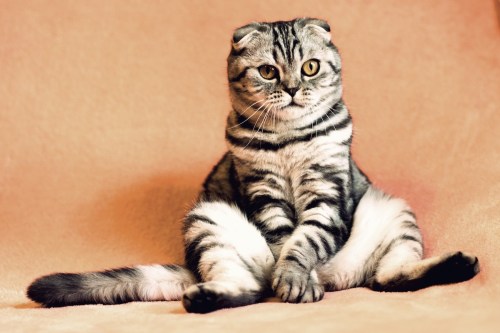
If you’ve adopted a male cat from a shelter or rescue, chances are your cat is already neutered. But if you’ve gotten your cat from a private breeder or seller, then you might be struggling with the decision to neuter your cat. When making that decision, it’s important to think carefully about the pros and cons of that procedure. Neutering can have a strong effect on your male cat’s behavior, so make sure you know what to expect from un-neutered male cat behavior when deciding on the best option for you and your cat.
What happens if I don’t neuter my cat?
According to VCA Hospitals, un-neutered cats might contribute to the cat population control issue. Millions of cats are euthanized each year because there aren’t enough homes for them, and an un-neutered male cat who comes into contact with an unspayed female can contribute to this ongoing issue.
Un-neutered male cat behavior can include several undesirable habits. Many un-neutered cats spray urine as a way of marking their territory, and they might do this within and outside of your home. An un-neutered cat is also more likely to be aggressive toward another un-neutered male. This is caused by competition between males who are trying to protect their territory, and these fights can result in serious injuries.
Cats that have not been fixed are also more likely to roam and travel great distances, particularly during mating season. This sexual interest may drive your cat to leave home and can increase the chances of his getting lost or injured while traveling.
Do male cats calm down after being neutered?
According to VCA Hospitals, neutering cats can help to reduce some of these negative behaviors. About 90% of neutered cats decrease their roaming habits, and neutering can also reduce fighting between cats. Neutering can also reduce or stop spraying in about 85% of cats who receive the procedure.
How much does it cost to neuter a cat?
If you’re worried about the cost of neutering your cat, it may be less expensive than you think. Having your cat neutered by a private vet costs an average of $200 to $400, but there are less expensive options. Low-cost clinics, which are typically owned and operated by nonprofits, still work with licensed veterinarians to perform the procedure. Ask your vet if they can recommend a low-cost option in your area if you can’t afford the traditional fee. Some low-cost clinics will neuter your cat for under $100. Best of all, you’ll most likely be able to take your cat home the same day.
Why should I neuter my cat?
There are many reasons to neuter your cat. VCA Hospitals explains that neutering can help to prevent unwanted behaviors like spraying and aggression. Neutered male cats often have urine that’s less pungent than the urine of un-neutered cats.
While neutering can change behaviors that are hormone-driven, like spraying and wandering, it won’t affect your cat’s other behaviors. If your cat is naturally overreactive or has a certain temperament, those factors won’t be affected by neutering your cat.
Neutering your cat also means you can safely keep him in a home with other cats. He’ll be less likely to fight with males, and if you have younger female cats who haven’t yet been spayed, you won’t run the risk of your male cat getting the female cat pregnant.
Why should I not neuter my cat?
There may be a few reasons to consider not neutering your cat. The first is if you plan on breeding your cat. Keep in mind that we have an overpopulation of cats, and breeding your pet can contribute to that overpopulation. If you’re a professional breeder working with a purebred cat who has excellent qualities that you want to pass on, then it makes sense to keep your cat intact.
Dr. Eric Barchas tells Catster that there is a link between neutering cats and rapid weight gain after their surgery. This can increase your cat’s risk of developing health issues related to obesity, like diabetes, kidney disease, and heart disease. Keep in mind, though, that carefully managing your cat’s diet and ensuring he gets plenty of exercise each day can help prevent obesity and related health issues.
Final thoughts
When it comes to deciding whether to neuter your cat, it’s important to learn about the pros and cons and to carefully weigh those factors. Your vet can also provide you with information specific to your cat’s health and your unique situation. Be sure to speak with your vet about any concerns you might have, and ask questions about what the surgery is like, what the recovery period is like, and any risk factors that you should be aware of. Because neutering your cat can play a role in his health and behavior, it’s important to make a decision that’s best for your cat, and your vet can help advise you during that process.
Editors' Recommendations
- This is why cats pee on clothes (and how you can save your wardrobe in the future)
- These useful tips can help you support your senior cat’s health
- Why do cats fight? They’re not just being jerks
- Why do cats roll in dirt? 10 reasons for their dust bath
- Why do cats cover their face when they sleep? This adorable behavior, explained